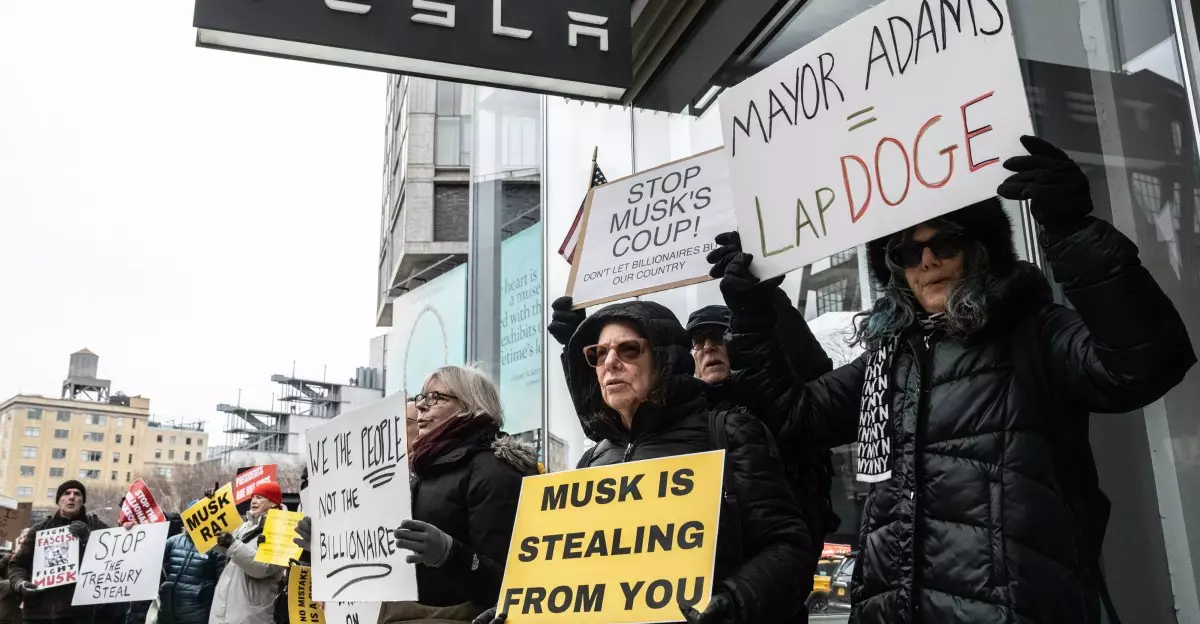In a striking display of discontent, protestors have congregated outside Tesla showrooms nationwide over the past weekend. The protests have gained momentum following the emergence of the trending hashtag #TeslaTakeover on social media platforms, particularly on the site Bluesky. This organic movement seems to reflect a growing dissatisfaction with Tesla’s CEO, Elon Musk, especially in light of his controversial role as the head of the Department of Government Efficiency during the Trump administration. While no individual protest has drawn a particularly large crowd, the sheer geographic spread of these gatherings—from prominent cities like New York to smaller communities such as Golden Valley, Minnesota—underscores a widespread unease among Americans regarding Tesla’s corporate governance.
Participants in the rallies seem to be united by a mix of political and social grievances. They are vocalizing concerns over Musk’s alleged association with far-right ideologies, as evidenced by the chants heard during protests: “Don’t buy swasticars” and “Elon Musk can go to Mars; we don’t need your Nazi cars.” This rhetoric suggests that many see Musk not just as a business leader but as a symbol of a larger political issue that they are deeply concerned about. Activists have criticized Musk’s perceived alignment with far-right groups, including Germany’s Alternative for Germany (AfD), and have questioned the ethics of supporting a company whose leader they associate with divisive rhetoric.
Furthermore, the economic ramifications of Musk’s actions are contributing to the waves of unrest. Tesla investors are reportedly concerned about the company’s declining stock value—plummeting by 21 percent since the beginning of Trump’s presidency has raised alarms about the impact of Musk’s public persona and political engagements on the electric vehicle manufacturer.
Recent disclosures reveal a troubling narrative emerging from within Tesla itself. Reports indicate that during internal discussions, employees and even senior management suggested that the company might fare better in Musk’s absence. This insight speaks volumes about internal morale and the company’s overall direction under his leadership. If senior staff feel that Musk should resign for the sake of the company’s future, it suggests an unsettled corporate environment that could ultimately affect productivity and creativity.
Interestingly, the protests have garnered attention not only through grassroots organizing but also through the involvement of high-profile figures. Actor and activist Alex Winter has been notably active on social media, promoting the protest events while urging Tesla owners to reconsider their allegiance to the brand. His engagement symbolizes how celebrity voices can effectively amplify grassroots movements, inspiring others to take action, whether by participating in the protests or reconsidering their consumer choices.
Similarly, musician Sheryl Crow made headlines by publicly announcing her decision to distance herself from Tesla, illustrating how individual choices can resonate within broader activism. Crow’s approach serves to show other consumers that their purchasing decisions are not just trivial transactions but serve as statements of personal values in the current political climate.
The surge of protests is far from over. Demonstrations are ongoing, with plans for additional events coinciding with the upcoming President’s Day holiday. Protests have been scheduled in numerous locations, further establishing a precedent that shows the refusal to remain silent against corporate and political wrongdoing.
Moreover, as activists continue to share their messages on social media, utilizing hashtags like #TeslaTakeover, the digital realm will likely continue to play a crucial role in mobilization efforts. Given the electric vehicle giant’s influential status in the modern automotive landscape, these protests will not only test Tesla’s public image but may also influence consumer behavior, investor confidence, and potentially even corporate governance practices moving forward.
The protests surrounding Tesla and Elon Musk reflect a complex intersection of consumer advocacy, social justice, and corporate ethics. As long as grievances remain unresolved, the outcry from protestors showcases a populace that is increasingly unwilling to accept the status quo.


Leave a Reply